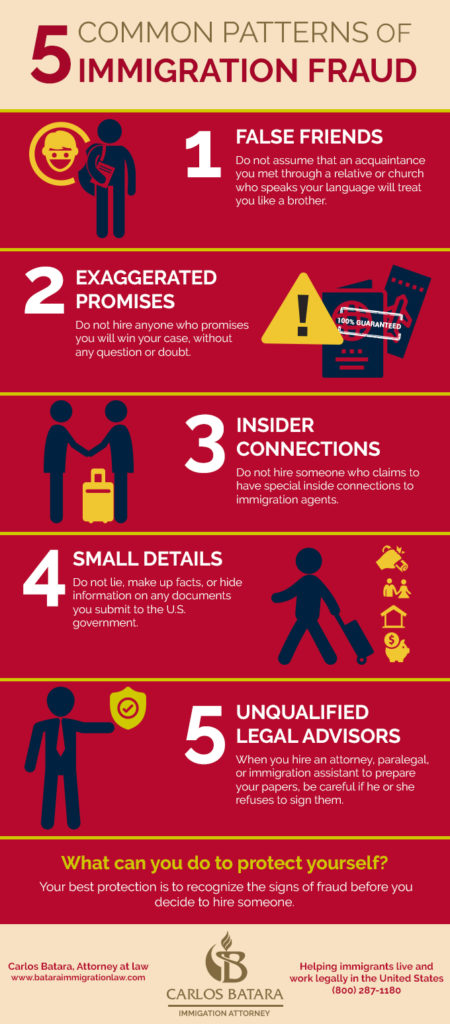
Long before I became an immigration attorney defending immigrants against fraud scams, I was alerted about false friends.
A popular song during my teenage years warned, “Smiling faces show no traces of the evil that lurks within.”
Today, as a green card lawyer helping immigrants win permanent residence, I know the sad truth of smiling faces. They can destroy immigration hopes and dreams.

Immigrant Families: Unwitting Victims Of Green Card Fraud
Immigration fraud is a silent epidemic. It sucks the life blood out of many deserving immigrant families.
The actual number of victims are unknown.
Many immigrants are too afraid to alert authorities.
These cases are not isolated incidents.
The problem affects all immigrant communities.
Notarios often pose a unique immigration fraud problem.
In regions like Southern California and Arizona, the problem has hit Latino and Hispanic communities especially hard. Both government officials and non-profit groups have tried to alert Spanish-speaking immigrants living in cities like Riverside, San Diego, San Bernardino, Escondido, Hemet, and Los Angeles about the danger.
One primary reason for the high rate of fraud victims in these communities stems from the deliberate misuse of the title, notarios, in Spanish.
In many Latin American countries, notarios are lawyers. This causes confusion for Latino immigrants living in the U.S.
Even though notaries are not equivalent to attorneys in the U.S., the distinction is not understood by many Spanish-speaking immigrants.
In the United States, a notary is able to take oaths and acknowledgements but cannot represent people in court or at agency interviews.
Moreover, they are not trained to give legal advice.
Lawyers, on the other hand, must graduate from law school – and pass a special licensing examination. Lawyers can represent you before immigration authorities and can give you legal advice regarding your potential immigration options, benefits, and risks.
However, all immigrants need protection against sophisticated green card scams. The criminals are diverse and potentially hidden behind every rock in local communities.
Consider:
- Community leaders, restaurant owners, judges have ripped-off unsuspeced immigrants and their families.
- And worse. The news is ripe with tales of law enforcement, immigration, and embassy officers who abused their trust and stole money, as well as the lives, of innocent victims.
The need to protect immigrants against such permanent residence fraud schemes is not confined to Hispanic neighborhoods.
Nor is such duplicity related to fraud in family-based green card cases.
Immigrants, from various countries, seeking a range of immigration benefits under various programs, including asylum, temporary protected status, and the Violence Against Women Act, have been subjected to manipulation by fraud artists.
Despite the efforts to warn immigrant families about such dangers, month after month, I receive calls from distressed individuals, who recently found out they were the victims of immigration fraud. Many times, they contact me too late.
By such time, even a challenge to the USCIS denial of their marriage-based green card application is often out of their reach.
Sadly, when it comes to immigration fraud, lawyers can sometimes provide neither help nor protection.
Immigration agents have already rejected the family-based immigration applications of U.S. citizen and lawful permanent resident spouses and their immigrant husbands and wives.
Interviewing officers are trained to spot immigration scams.
Once the fraud is discovered, the government usually sends the case to immigration court where victims now face family separation and must seek defense against deportation and removal charges. In an ironically cruel twist of fate, the victims are also sometimes forced to protect themselves against criminal convictions as well.
At these moments, the help of an family immigration defense attorney is necessary, albeit perhaps insufficient, to preserve the family unity of the victim’s spouse and children.
5 Common Patterns Of Immigration Fraud
Based on my experience, most reported cases of immigration fraud fit into common patterns.
If you learn these patterns, it may save you or your family members from becoming an immigration fraud victim.
Here are five ways to avoid becoming the next victim of immigration fraud:
- Beware False Friends – Do not assume that an acquaintance you met through a relative or church who speaks your language will treat you like a brother.
- Beware Exaggerated Promises – Do not hire anyone who promises you will win your case, without any question or doubt.
- Beware Insider Connections – Do not hire someone who claims to have special inside connections to immigration agents.
- Beware Small Details – Do not lie, make up facts, or hide information on any documents you submit to the U.S. government.
- Beware Unqualified Legal Advisors – When you hire an attorney, paralegal, or immigration assistant to prepare your papers, be careful if he or she refuses to sign them.
So what can you do to protect yourself?
The government has set up various systems to report if you have been a victim of an immigration scam.
Yet, in my view, this is a secondary protection.
In short, your best protection is to know how to recognize the signs of fraud before you decide to hire someone.
Then – and only then – should you choose a lawyer (or immigration assistant) to help guide you and your family members.
Finally, remember those who prey on immigrants will assume you are scared. If you suspect immigration fraud, walk away.
Be cautious. Be alert.
Protect yourself from becoming the next victim.




